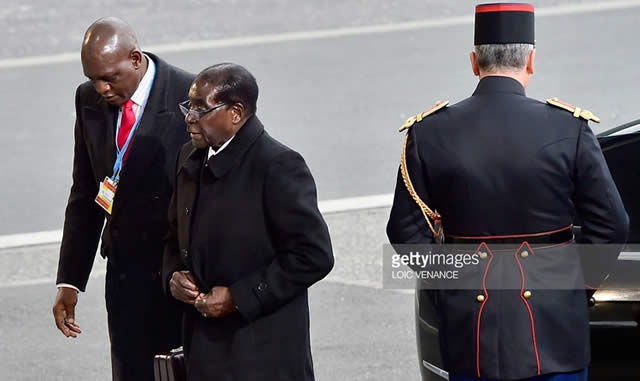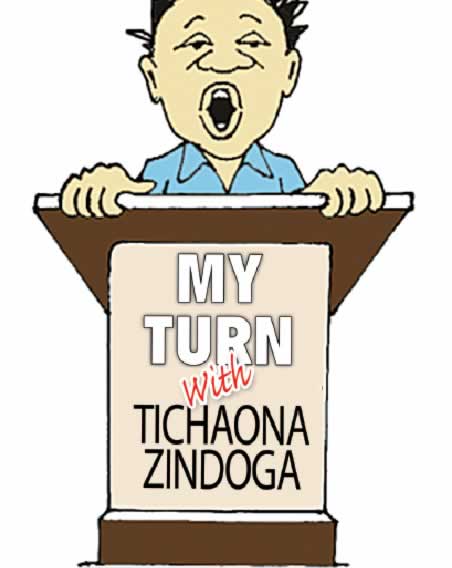‘Clean up your own mess’


President Mugabe, who is Chairman of the African Union, arrives at the Le Bourguet Complex for the official opening of COP21 on Monday
Statement by His Excellency the President of the Republic of Zimbabwe and Chairman of the African Union, Cde R. G. Mugabe at the Leadership event at the United Nations Framework Convention on Climate Change Conference, Paris, France, on Monday, November 30 2015.
Your Excellency, Mr Francois Hollande, the President of France,
Your Excellencies, Heads of State and Government,
Your Excellency, the Secretary-General of the United Nations, Mr Ban Ki-moon,
The Executive Secretary of the United Nations Framework Convention on Climate Change,
Distinguished Delegates,
Ladies and Gentlemen,
Comrades and Friends.
I wish to thank you and the French people, for hosting this meeting. This is especially so in view of the fact that, hardly two weeks ago, many French lives were lost in a series of brutal terrorist attacks. We condemn such senseless attacks on innocent lives, and support global efforts to fight this challenge.Mr President,
Today we meet to address another major global challenge; that of climate change, which calls for global responses on our part. To that end, Mr President, Zimbabwe aligns itself with the common positions of the Africa Group, and of the G77 and China, on this very important issue, both for us and for future generations on our planet.
Today we face grave danger, as extreme weather phenomena, such as floods, droughts, and heat waves, among others, become the norm rather than the exception, in our respective countries. These extreme vagaries of the weather unleash hunger, disease, displacement, destruction and death on the affected communities. That damage, to livelihoods and on productivity, is particularly devastating for those of us in the developing world.
Mr President,
We are agreed that, unless climatic trends are reversed, disaster stalks our planet Earth. None of us here can dispute the fact that urgent corrective measures and actions, based on tenets of equity and justice, must be taken to avert the impending disaster. This, Mr President, is what we should strive to achieve at this important summit.
We are here to reach an agreement that will enhance the full, effective, balanced and sustained implementation of the 1992 United Nations Framework Convention on Climate Change, not to revise or otherwise weaken that Convention. We are dismayed by, and reject, attempts by developed countries to question and modify the very foundations of the global compact on common, but differentiated responsibilities, that form the bedrock of the Convention.
It is unconscionable that, not only are developed countries miserly in providing the means for implementation of the Convention, but also want to inordinately burden us with cleaning up the mess they themselves created.
Mr President,
We are neither creating nor imposing new responsibilities, for our developed country partners. They have accepted their historical responsibilities in contributing to the precarious climate environment we currently live in. Their record, to date, in living up to their obligations and commitments under the Convention and the Kyoto Protocol, has been well below expectations. Confidence, between and among us, a key ingredient in our partnership, has been eroded as a result. We have the opportunity, at this conference, to restore it.
Developed countries must assume their leading role in combating climate change. We, on our part, commit ourselves to meeting our obligations. When we express our expectations on such issues as mitigation and adaptation, loss and damage, provision of long-term financial resources, technology development and transfer, capacity-building, we do so as partners, not as deserving objects of charity from the developed world. For instance, African countries have collectively pledged mitigation efforts up to 2020 that exceed those of developed countries. We have done so, in spite of the fact that we contribute less to climate change, and in spite of our limited capacities to withstand its destructive effects. We cannot, and we will not, assume more obligations. Doing so will dent our development aspirations and, in particular, our efforts to eradicate poverty.
Mr President,
The world is looking to us, as we meet here, to move from rhetoric to actions. Those actions must start here. Let us demonstrate bold and determined leadership, and assure a safer and brighter future for current and future generations, by adopting, here in Paris, a fair, equitable, ambitious, comprehensive, balanced and sustainable agreement under the UN Framework Convention on Climate Change.
I thank you.









Comments